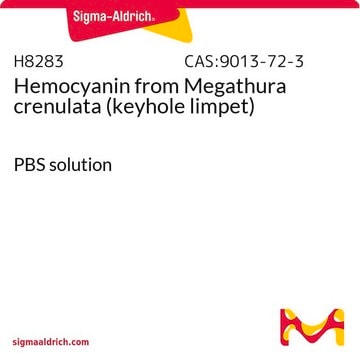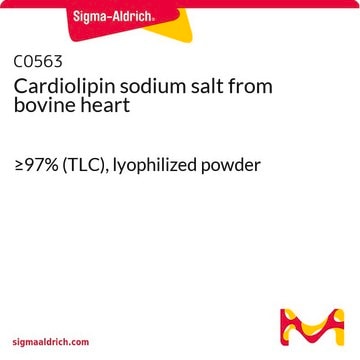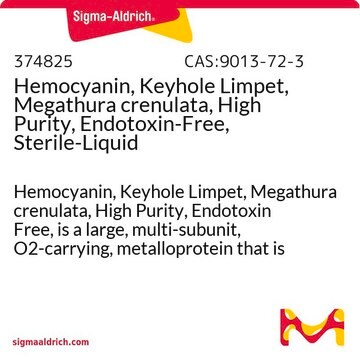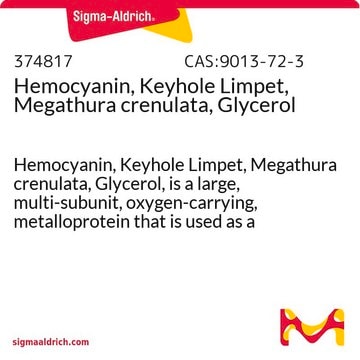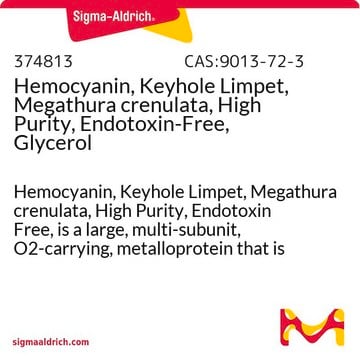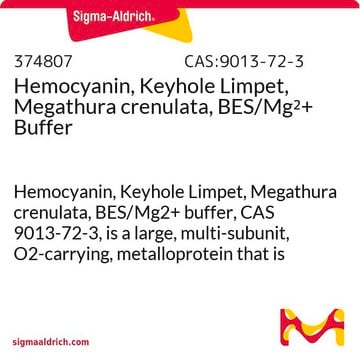B8556
Hemocyanin from mollusk
buffered aqueous solution
Synonym(s):
Blue Carrier®
Sign Into View Organizational & Contract Pricing
All Photos(1)
About This Item
Recommended Products
biological source
Concholepas sp. (Concholepas concholepas )
Quality Level
form
buffered aqueous solution
technique(s)
bioconjugation: suitable
storage temp.
2-8°C
Looking for similar products? Visit Product Comparison Guide
Application
Blue Carrier is an oxygen-carrying protein isolated from the hemolymph of the mollusk Concholepas concholepas. It is highly immunogenic, useful as a carrier protein for the production of antibodies to small molecules. An example of the protocol is given in reference to production of antibodies to gizzerosine.
Hemocyanin is a carrier protein used in antibody production. It has been used to promote antibody production against haptins and peptides, in therepy for bladder carcinoma, and has a component in vaccines for cancer.
Biochem/physiol Actions
Highly soluble carrier protein used in antibody production
Physical form
100 mg in 0.5 mL of 0.15 M NaCl, 0.1 M sodium phosphate, pH 7.2
Legal Information
Blue Carrier is a registered trademark of Biosonda S.A.
Storage Class Code
10 - Combustible liquids
WGK
WGK 3
Flash Point(F)
Not applicable
Flash Point(C)
Not applicable
Personal Protective Equipment
dust mask type N95 (US), Eyeshields, Gloves
Certificates of Analysis (COA)
Search for Certificates of Analysis (COA) by entering the products Lot/Batch Number. Lot and Batch Numbers can be found on a product’s label following the words ‘Lot’ or ‘Batch’.
Already Own This Product?
Find documentation for the products that you have recently purchased in the Document Library.
Enhanced structural stability of Concholepas hemocyanin increases its immunogenicity and maintains its non-specific immunostimulatory effects.
Arancibia S., et al.
European Journal of Immunology (2011)
Bruno Moltedo et al.
The Journal of urology, 176(6 Pt 1), 2690-2695 (2006-11-07)
We determined the antitumor properties of a newly available hemocyanin obtained from the Chilean gastropod Concholepas concholepas (Biosonda Corp., Santiago, Chile) in a syngeneic heterotopic mouse bladder carcinoma model. Since keyhole limpet hemocyanin (Pierce, Rockford, Illinois) is used increasingly in
M I Becker et al.
Hybridoma, 17(4), 373-381 (1998-10-28)
This study is the first report of the development of monoclonal antibodies (MAbs) against gizzerosine (GZ), one of the causative agents of black vomit, a serious poultry disease. Balb/c mice were immunized with different GZ conjugates; the most immunogenic conjugate
Harold Oliva et al.
Hybridoma and hybridomics, 21(5), 365-374 (2002-12-10)
We studied the reactivity of mouse monoclonal antibodies (MAbs) against the hemocyanin from the Chilean marine gastropod Concholepas concholepas (CCH). This protein has been successfully used as a carrier to produce antibodies to haptens and peptides. All MAbs (13) belonging
Anaphylaxis caused by hemocyanin contained in shrimp cephalothorax.
Daiana Guillen et al.
Annals of allergy, asthma & immunology : official publication of the American College of Allergy, Asthma, & Immunology, 113(6), 674-675 (2014-10-14)
Our team of scientists has experience in all areas of research including Life Science, Material Science, Chemical Synthesis, Chromatography, Analytical and many others.
Contact Technical Service